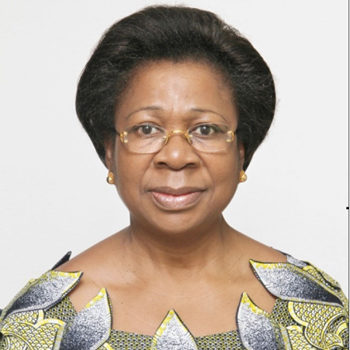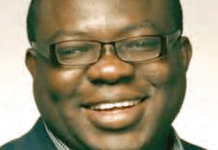
With the burden of infectious diseases that sub-Saharan Africa has to grapple with, particularly the spread of tropical diseases such as malaria, tuberculosis and onchocerciasis (river blindness), there is so much for which to appreciate the efforts of public health professionals and researchers like Professor Uche Veronica Amazigo, who continuously work towards improving the quality of life of millions of Africans.
Prof. Amazigo is an internationally renowned public health administrator, biologist and professor of medical parasitology and public health. She is well recognised for her research on onchocerciasis and the introduction and application of the innovative, community-directed treatment mechanism in the control of neglected tropical diseases. She played a pivotal part in the success of onchocerciasis control by strengthening community health systems and helping to engage and empower 500,000 communities across 19 countries covered by the African Programme on Onchocerciasis (APOC) established by the World Health Organisation while she was director of the programme from 2005-2011.
Onchocerciasis is the world’s second leading infectious cause of blindness. As a public health problem, the disease is most closely associated with Africa, where it constitutes a serious obstacle to socio-economic development. Out of some 120 million people worldwide who are at risk of onchocerciasis, 96 per cent are in Africa. It thus becomes apparent why Amazigo’s efforts at taming the disease and others have gained widespread recognition and accolades.
Path to prominence
Uche Amazigo was born to the Onubogu family of Enugu State, Nigeria. She received her Ph.D in Biology and Medical Parasitology from the University of Vienna, Austria. She also holds a Diploma in Tropical Medicine and Parasitology from the Bernhard-Nocht Institute of Tropical Medicine in Hamburg, Germany, as well a Fellowship in International Health from the Harvard T.H. Chan School of Public Health.
Early in her career, Amazigo worked as a senior lecturer at the University of Nsukka, Enugu State, where she taught medical parasitology and public health. It was during this period that she began studying onchocerciasis (river blindness) after encountering a pregnant woman plagued by the disease’s itchy lesions and depigmentation during her travels around the area in 1991. She joined a rural women’s support group in order to better study the social effects that the disease had on rural communities. She then applied for and received a research grant from the United Nations’ Special Programme for Research and Training in Tropical Diseases (TPROF) in order to continue her research into river blindness.
Amazigo’s pioneering research on the social impact of river blindness in rural Nigeria revealed, for the first time, startling results about the social isolation, stigmatisation, suffering and disability caused by the disfigurement and unrelenting itching from the disease. This discovery brought international awareness on the morbidity due to river blindness and its social implications.
Amazigo worked for the TPR for several years, within which she developed a programme for training community workers to treat themselves and others, as well as keeping record books of the treatments. She brought her findings to the WHO, where her studies were replicated. The results from this replication resulted in the founding of the African Programme for Onchocerciasis Control (APOC) in 1995.
Exploits and influence
Amazigo joined the APOC as a scientist in 1996. Her work with the APOC was built upon her work with the TPROF programme, and resulted in the development of Community-Directed Treatment with Ivermectin (CDTI), with the use of Ivermectin as the sole drug for treating Onchocerciasis. It is estimated that her CDTI strategy has resulted in the treatment of over 112.4 million people for Onchocerciasis, 11 million people for malaria control, and 37 million people for the control of other diseases.
Amazigo spent four years as the Chief of the WHO’s sustainable drug distribution unit from 2001 to 2005. She served as the director of APOC from 2005 until 2011. During this period, she engaged 16 African governments, 14 international non-governmental organisations (NGOs), 20 bilateral and multi-lateral donors, and pharmaceutical companies.
In 2007, with her visionary leadership skills, she initiated and spearheaded the introduction of a curriculum and training module on community-directed interventions (CDI) in Faculties of Medicine and Health Sciences in more than 14 universities in Africa.
Amazigo also initiated the scientific evaluations which provided evidence of possible elimination of river blindness in some sites in APOC countries including Kaduna and Ebonyi States, Nigeria, and spearheaded the repositioning of WHO/APOC from a control to an elimination Programme. She has over 55 publications in international peer-reviewed journals.
After retiring from APOC, she founded the Pan-African Community Initiative on Education and Health (PACIEH) in 2013. She is a member of the Board of Trustees of Sightsavers and the TY Danjuma Foundation. She is also on the Advisory Board of Massachusetts General Hospital (MGH) Centre for Global Health and Merck’s Global Advisory Board on Maternal Mortality.
Awards and Recognitions
Amazigo valuable contributions in health policy development, research, public-private partnership and sustainable community-driven health interventions have earned her many awards and recognitions, which include the Prince Mahidol Award, under the patronage of the Thai Royal Family. She was awarded a Knight of the National Order of merit of Burkina Faso, She was also recognised by the US Agency for International Development and the National Medical Research Institute of Tanzania.
Amazigo received the Prof. Jean Mayer Global Citizenship Award from Tufts University, Boston Massachusetts, USA. While working as the Director of the WHO/APOC programme, she was awarded the 1 million Euro António Champalimaud Vision Award in 2011, which is the biggest global award for outstanding contributions to the prevention of visual impairment and blindness.
She is a Fellow of the Nigerian Academy of Science; Harvard T.H. Chan School of Public Health; and Parasitology and Public Health Society of Nigeria.










